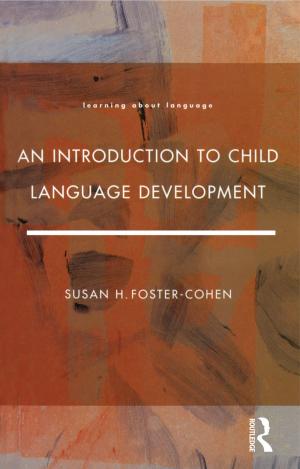The Developing Child in the 21st Century
A global perspective on child development
Nonfiction, Reference & Language, Education & Teaching, Educational Theory, Educational Psychology, Health & Well Being, Psychology, Child & Adolescent, Child Development| Author: | Sandra Smidt | ISBN: | 9781135048464 |
| Publisher: | Taylor and Francis | Publication: | June 19, 2013 |
| Imprint: | Routledge | Language: | English |
| Author: | Sandra Smidt |
| ISBN: | 9781135048464 |
| Publisher: | Taylor and Francis |
| Publication: | June 19, 2013 |
| Imprint: | Routledge |
| Language: | English |
Offering a sociocultural approach to education and learning, this fascinating exploration of childhood provides an in-depth understanding of how children make sense of the world and the people in it. Examining the ways in which children express their thoughts, feelings and actively generate meaning through experience and interaction, this fully revised and updated new edition is illustrated throughout by extensive case studies and covers a diverse range of topics, including:
- socio-historical and global child development over time and place;
- the child as meaning-maker and active learner;
- learning in the context of family, culture, group, society;
- representing and re-representing the world;
- understanding roles, identity, race and gender;
- making sense of science and technology;
- the implications of neuroscience.
Taking a clearly articulated and engaging perspective, Sandra Smidt draws upon multiple sources and ideas to illustrate many of the facets of the developing child in a contemporary context. She depicts children as symbol users, role-players, investigators and creative thinkers, and follows children's progress in forming their understanding of their environment, asking questions about it, and expressing it through music, dance, art and constructive play. Highly accessible, and with points for reflection concluding each chapter, The Developing Child is essential reading for teachers, lecturers and students taking courses in early childhood, psychology or sociology.
Offering a sociocultural approach to education and learning, this fascinating exploration of childhood provides an in-depth understanding of how children make sense of the world and the people in it. Examining the ways in which children express their thoughts, feelings and actively generate meaning through experience and interaction, this fully revised and updated new edition is illustrated throughout by extensive case studies and covers a diverse range of topics, including:
- socio-historical and global child development over time and place;
- the child as meaning-maker and active learner;
- learning in the context of family, culture, group, society;
- representing and re-representing the world;
- understanding roles, identity, race and gender;
- making sense of science and technology;
- the implications of neuroscience.
Taking a clearly articulated and engaging perspective, Sandra Smidt draws upon multiple sources and ideas to illustrate many of the facets of the developing child in a contemporary context. She depicts children as symbol users, role-players, investigators and creative thinkers, and follows children's progress in forming their understanding of their environment, asking questions about it, and expressing it through music, dance, art and constructive play. Highly accessible, and with points for reflection concluding each chapter, The Developing Child is essential reading for teachers, lecturers and students taking courses in early childhood, psychology or sociology.















